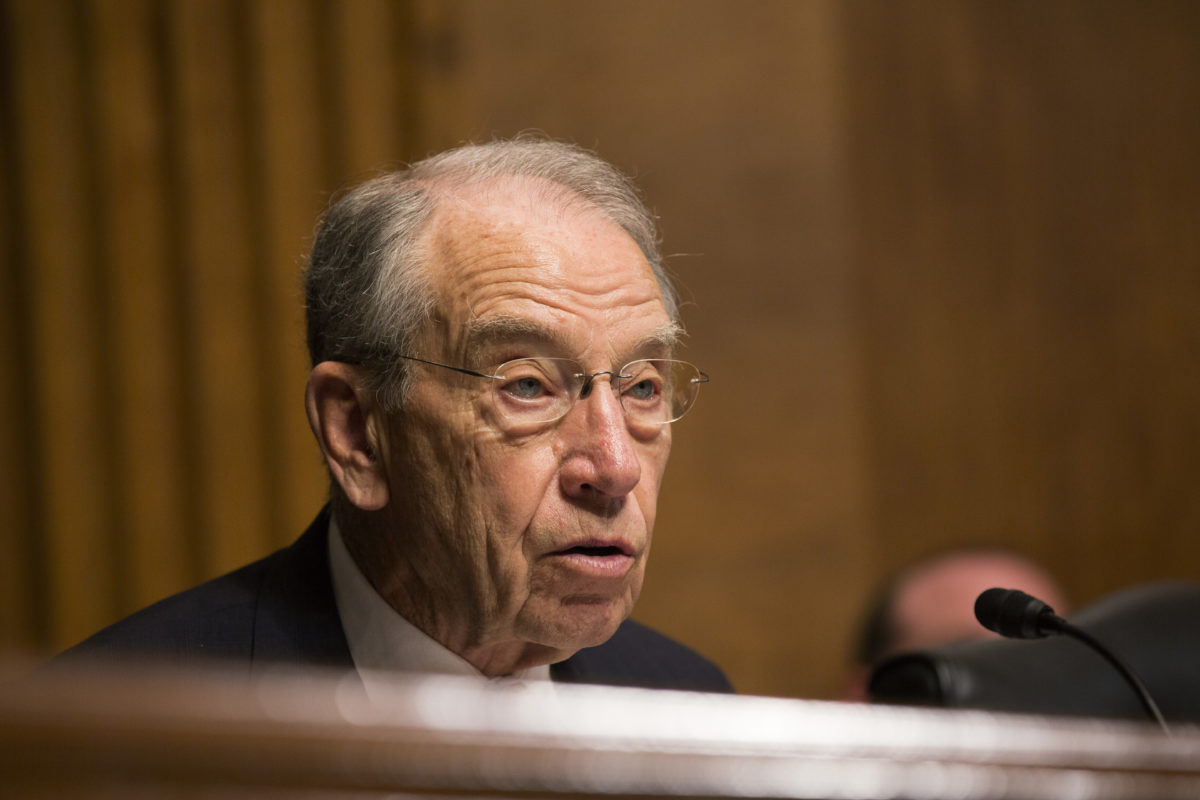Politics
GOP Senators Really Want To See A ‘Highly Classified’ FBI Memo About The Hillary Clinton Investigation

Rep. Chuck Grassley asks U.S. Customs and Border Protection Acting Deputy Commissioner Ronald D. Vitiello questions during testimony before the Senate Judiciary Committee, Subcommittee on Border Security and Immigration, during a hearing entitled "Building America's Trust through Border Security: Progress on the Southern Border" in Washington, D.C., May 23, 2017. U.S. Customs and Border Protection Photo by Glenn Fawcett | By U.S. Customs and Border Protection (170523-H-NI589-0415) [Public domain], via Wikimedia Commons
The Republican chairmen of three Senate committees are pressing Attorney General William Barr for details about “highly classified information” that the FBI declined to investigate as part of the Hillary Clinton email probe.
According to the Republicans, the FBI drafted a memo in May 2016 saying that the information was “necessary” to complete the investigation into Clinton’s handling of classified information on her private email server.
But as the Justice Department inspector general found in a report released last year, the FBI declined to take up the matter before closing the Clinton investigation in July 2016.
The trio of senators want to know why.
The inspector general’s finding “raises significant issues associated with the FBI’s failure to review certain highly classified information in support of its Midyear investigation,” reads the letter to Barr, signed by GOP Sens. Lindsey Graham of South Carolina, Chuck Grassley of Iowa and Ron Johnson of Wisconsin, the chairmen of the Senate Judiciary, Finance and Homeland Security Committees, respectively.
Republicans have pressed the Justice Department repeatedly about the information. They inquired with the Justice Department about the matter on July 31, 2018, in a phone call on Sept. 17, 2018, and in a letter on Oct. 17, 2018.
After the September 2018 phone call, the Justice Department declined to provide a briefing to the Senate Judiciary Committee, claiming that doing so would interfere with special counsel Robert Mueller’s Russia investigation.
“Now that the Special Counsel’s investigation has concluded, we are unaware of any legitimate basis upon which the Department can refuse to answer the Judiciary Committee’s inquiries,” the senator’s wrote.
The FBI opened a counterintelligence investigation into Clinton’s use of her private server in July 2015. The probe was closed to much fanfare on July 5, 2016, with then-FBI Director James Comey saying that while Clinton was “extremely careless” in using a private server to exchange classified information, “no reasonable prosecutor” would try a case against the Democratic presidential candidate.
But Republicans in both the House and Senate have questioned how the FBI handled the investigation.
According to the inspector general’s report, the FBI late in the Clinton investigation “considered obtaining permission from the Department to review certain classified materials that may have included information potentially relevant to the Midyear investigation.”
In a memo drafted for Deputy Attorney General Sally Yates, the FBI said that the review of the “highly classified materials was necessary to complete the investigation.” The FBI did not submit the memo, claiming, according to the IG, “that they believed this information would not materially impact the conclusion.”
The inspector general’s report includes a classified appendix that further describes the “highly classified information,” how it is relevant to the Clinton probe, and the FBI’s rational for not trying to access it.
All content created by the Daily Caller News Foundation, an independent and nonpartisan newswire service, is available without charge to any legitimate news publisher that can provide a large audience. All republished articles must include our logo, our reporter’s byline and their DCNF affiliation. For any questions about our guidelines or partnering with us, please contact [email protected].

